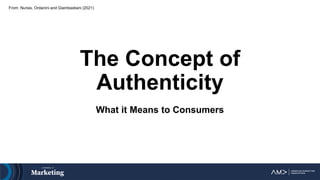
The Concept of Authenticity: What it Means to Consumers
- 1. From: Nunes, Ordanini and Giambastiani (2021) The Concept of Authenticity What it Means to Consumers
- 2. From: Nunes, Ordanini and Giambastiani (2021) Consumers Crave Authenticity • “One of the most significant differences between Old and New Consumers is the latter’s desire for authenticity” (Lewis and Bridger 2000) • “Consumers’ search for authenticity is one of the cornerstones of contemporary marketing” (Brown, Kozinets, and Sherry 2003). • “Organizations today must learn to understand, manage, and excel at rendering authenticity” (Gilmore and Pine 2007). But what exactly does authenticity mean to consumers?
- 3. From: Nunes, Ordanini and Giambastiani (2021) Defining Authenticity Despite widespread agreement about authenticity’s importance in marketing, no commonly accepted definition exists We re-conceptualize authenticity after… - Reviewing its usage in prior literature - Collecting evidence of its meaning directly from consumers, including In-depth interviews with consumers A survey of a nationally representative sample of consumers A survey of executives - Reconciling the literature with the definitions provided by consumers and executives - Validating the role of six distinct types of judgments consumer make when assessing the authenticity of a consumption experience Conclusion: Authenticity is jointly determined by six distinct and loosely related component judgments that consumers make when assessing authenticity
- 4. From: Nunes, Ordanini and Giambastiani (2021) Authenticity Meaning Component Definition Accuracy The extent to which a provider is perceived as transparent in how it represents itself and its products/services, and thus reliable in terms of what it conveys to consumers Connectedness The extent to which a consumer feels engaged and familiar with a source and/or its offering, and sometimes even transformed by it Integrity The extent to which a provider is perceived as being intrinsically motivated, not acting out of its own financial interests, while active autonomously and consistency over time Legitimacy The extent to which a product or service adheres to shared norms, standards, rules or traditions present in the market Originality The extent to which a product or service stands out from mainstream offerings present in the market and does so without unnecessary embellishments Proficiency The extent to which a provider is perceived as properly skilled, exhibited craftsmanship or expertise
- 5. From: Nunes, Ordanini and Giambastiani (2021) What Matters When? • Overall, proficiency seems to matter most, legitimacy matters least. • How context influences the importance of authenticity features - Proficiency matters more for hedonic goods than utilitarian goods - Legitimacy matters for utilitarian products, but not for hedonic products - Integrity is more important for durable goods than consumable goods - Originality means more for low co-production services than high co-production services - Legitimacy matters more when assessing the authenticity of high co-production services • Authenticity predicts consumers’ attitudes and behavioral intentions toward offering (information search, purchase, word of mouth) -
Editor's Notes
- Authors: Use the slide masters as much as possible. Begin by going into the first master and adding your names and year of publication into the it. It should populate the other slides.
